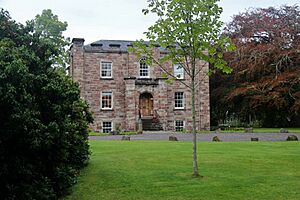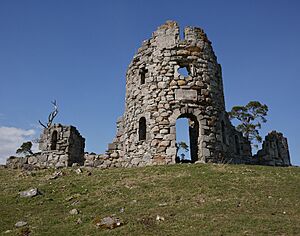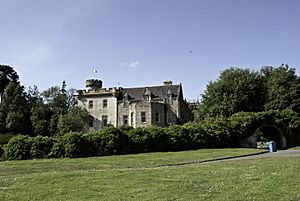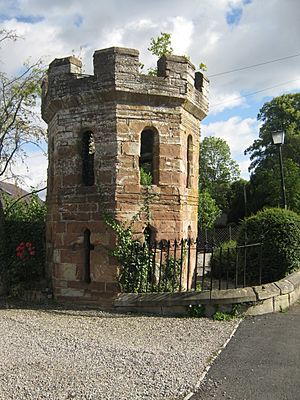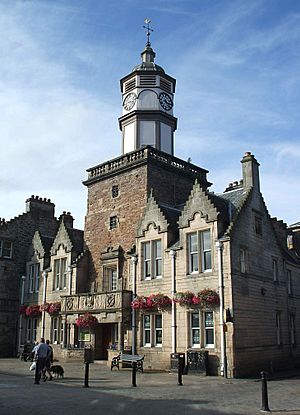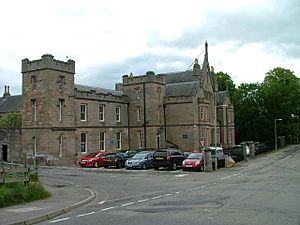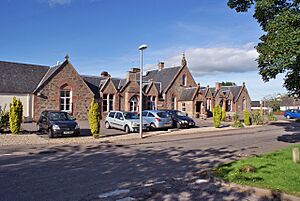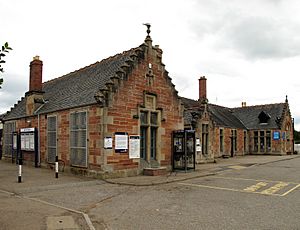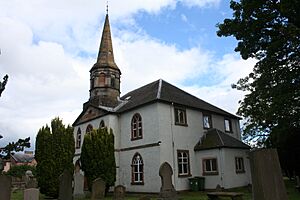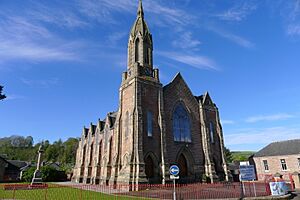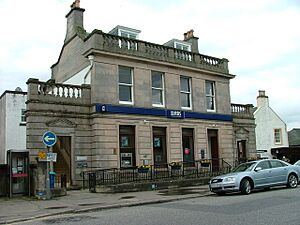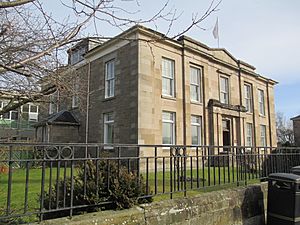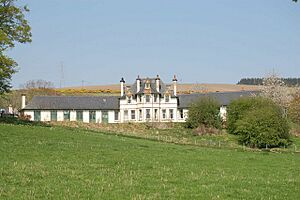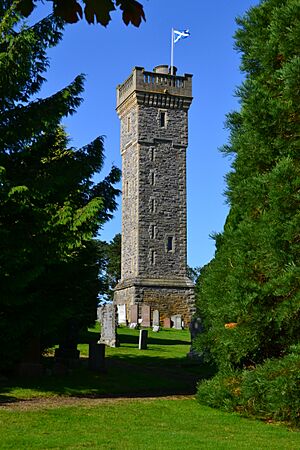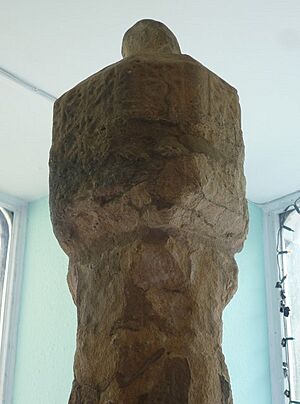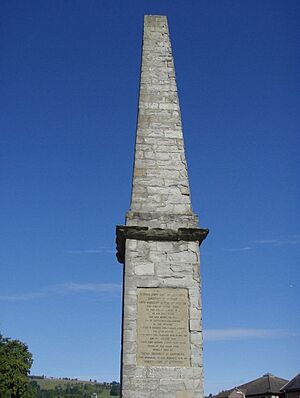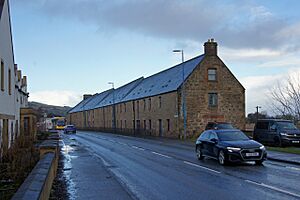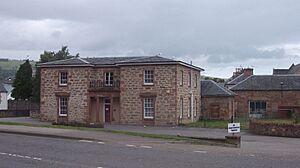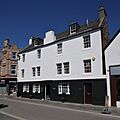List of listed buildings in Dingwall facts for kids
Did you know that some buildings are so special they get protected by law? These are called listed buildings, and they are important parts of Scotland's history and culture. They are like treasures that tell us stories about the past.
This article will take you on a tour of some of these amazing listed buildings in the area of Dingwall in the Highland region of Scotland. Each one has its own unique story!
Contents
Historic Homes and Castles
Dingwall is home to some fascinating old buildings, from grand castles to unique follies.
The Castle and Roderick Maclennan Monument
At Castle Street, you can find the site of an old castle and a monument dedicated to Roderick Maclennan. This area reminds us of Dingwall's long history, going back to medieval times when castles were important for protection. The monument adds to the historical feel of the place.
Caisteal Gòrach
Near Tulloch Castle stands a very interesting building called Caisteal Gòrach. Its name means "Folly Castle" in Scottish Gaelic. A folly is a building made for decoration, often designed to look like an old ruin or a castle, but it wasn't built for defence. Caisteal Gòrach is a great example of this playful style of architecture. It's listed as Category A, meaning it's of national importance!
Tulloch Castle
Tulloch Castle is a grand building with a long history. It has been a family home for centuries and now serves as a hotel. You can even find an arched tunnel entrance there! Castles like Tulloch often have many stories hidden within their walls, from ancient battles to grand parties.
Dovecote
Also on Castle Street, there's a dovecote. A dovecote is a building specifically designed to house pigeons or doves. In the past, these birds were kept for their meat, eggs, and sometimes even for their droppings, which were used as fertilizer. This dovecote is a reminder of how people lived and farmed many years ago.
Important Public Buildings
Many listed buildings in Dingwall are places where people gathered, learned, or received important services.
Dingwall Town Hall
The Dingwall Town Hall on High Street is a very important building for the town. Town halls are usually where local government meetings happen and where community events are held. This building has likely seen many important decisions and celebrations over the years.
Dingwall Sheriff Court
The Sheriff Court on Ferry Road is a building where legal matters are handled. It also used to house a prison and a police station. These buildings are crucial for maintaining law and order in a community.
Ross Memorial Hospital
The Ross Memorial Hospital on Ferry Road is another significant listed building. Hospitals are vital for the health and well-being of a community. This building has served as a place of healing for many years.
Dingwall Railway Station
The Dingwall Railway Station on Station Road is a key part of the town's transport history. Railway stations were once bustling hubs, connecting towns and cities and allowing people and goods to travel across the country. The station includes its platform ranges and a staff shelter.
Churches and Religious Sites
Churches are often among the oldest and most beautiful buildings in a town, reflecting its spiritual history.
St Clements Church
St Clements Church, also known as the Church of Scotland Parish Church, is located on Tulloch Street. This church is listed as Category A, meaning it's of national importance. It includes its gatepiers and burial ground, which often contain old gravestones that tell stories of past residents.
Free Church Of Scotland
The Free Church of Scotland on High Street is another important religious building in Dingwall. Churches like this have played a central role in the community, not just for worship but also for social gatherings and support.
Other Notable Buildings and Structures
Dingwall has many other interesting listed buildings, each with its own story.
Royal Bank Of Scotland and Clydesdale Bank
Both the Royal Bank of Scotland and the Clydesdale Bank (Park House) on High Street are listed buildings. Banks are important for the economy of a town, and these buildings show the architectural styles popular when they were built.
Highland Theological College
What is now the Highland Theological College on High Street was once known as the Hydro Board. This building has changed its purpose over time, from an administrative office to a place of learning.
Former Seaforth Sanatorium And Lodge
Located in Maryburgh, the Former Seaforth Sanatorium and Lodge is a listed building. Sanatoriums were special hospitals, often for people with long-term illnesses, built in places thought to have healthy air.
Hector Macdonald Memorial
On Mitchell Hill, you'll find the Hector Macdonald Memorial. Memorials are built to remember important people or events. This one honours Hector Macdonald, a famous Scottish soldier.
Mercat Cross
The Mercat Cross on High Street is a historic market cross. In Scottish towns, a mercat cross was a symbol of a burgh's right to hold a market or fair. It was often a central meeting point for trade and public announcements.
Cromartie Memorial, Obelisk
On Tulloch Street, there is the Cromartie Memorial, which is an obelisk. An obelisk is a tall, four-sided, narrow tapering monument which ends in a pyramid-like shape at the top. These are often built to commemorate important figures or events.
Warehouse, Former Ben Wyvis Distillery
On Station Road, you can find a warehouse that was once part of the Ben Wyvis Distillery. Distilleries are places where alcoholic drinks like whisky are made. This building is a reminder of Dingwall's industrial past.
Greenhill Street Park Garage
The Greenhill Street Park Garage, which was formerly Park Cottage, is also a listed building. This shows that even everyday buildings can be important enough to be protected for their history or architecture.
Images for kids
Key
The scheme for classifying buildings in Scotland is:
- Category A: "buildings of national or international importance, either architectural or historic; or fine, little-altered examples of some particular period, style or building type."
- Category B: "buildings of regional or more than local importance; or major examples of some particular period, style or building type, which may have been altered."
- Category C: "buildings of local importance; lesser examples of any period, style, or building type, as originally constructed or moderately altered; and simple traditional buildings which group well with other listed buildings."
In March 2016 there were 47,288 listed buildings in Scotland. Of these, 8% were Category A, and 50% were Category B, with the remaining 42% being Category C.
See also
- List of listed buildings in Highland
 | Charles R. Drew |
 | Benjamin Banneker |
 | Jane C. Wright |
 | Roger Arliner Young |


